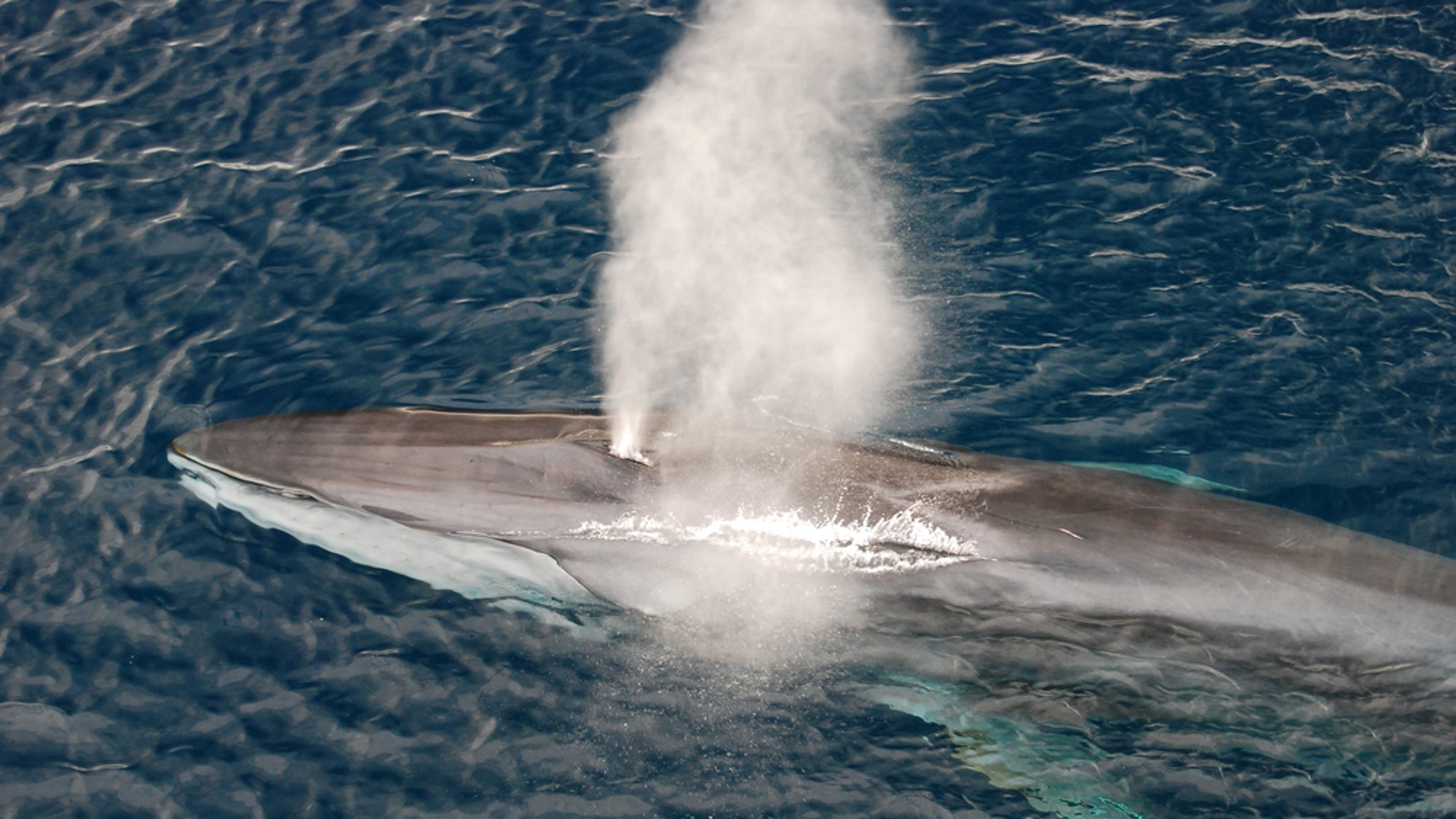Hidden DNA found in blue whales reveals they've been mating with other species — and their hybrid offspring
Newly sequenced genomes of blue whales in the Atlantic Ocean contain "unexpectedly high" levels of fin whale DNA, hinting that the two species have been interbreeding much more than previously realized.

Blue whales in the Atlantic Ocean are harboring a previously unknown and potentially alarming level of hybrid DNA, a new study shows. The findings hint that whale hybrids are much more reproductively viable than previously realized.
Blue whales (Balaenoptera musculus) are the world's largest animal, capable of reaching an astonishing 110 feet (34 meters) long, around three times longer than a school bus.
The number of these giants plummeted in the early 20th century due to extreme levels of commercial whaling. As a result, blue whales are currently listed as endangered by the International Union for Conservation of Nature's (IUCN) Red List of Threatened Species, although their numbers are starting to rebound worldwide. Of the four subspecies of blue whale, B. musculus musculus, which is found in the North Atlantic and North Pacific, is one of the most at-risk.
In a new study, published Jan. 6 in the journal Conservation Genetics, researchers analyzed the genomes of B. m. musculus in the North Atlantic for signs of inbreeding, which could impede the recovery of this group.
The researchers created a "de novo" genome for this population, meaning it was created from scratch, by piecing together bits of DNA from different individuals. The team then used this new genetic blueprint as a template to further analyze the full or partial genomes of 31 individuals from across this population's range.
"This is a long, laborious process akin to assembling a huge jigsaw puzzle with no picture on the box for guidance," study co-author Mark Engstrom, an ecological geneticist at the University of Toronto, told Live Science in an email. But once the puzzle has been solved, it becomes much easier to do it again and again, he added.
They found that each of the sampled whales had some fin whale (Balaenoptera physalus) DNA lurking within their genomes. Around 3.5% of the group's DNA came from fin whales on average.
Get the world’s most fascinating discoveries delivered straight to your inbox.
Related: Nuclear bomb detectors uncover secret population of blue whales hiding in Indian Ocean
Scientists have long known that blue whales and fin whales can reproduce to create hybrids of the two species, despite blue whales being around 85 tons (77 metric tons) heavier on average, according to The New York Times. These hybrids are sometimes referred to as "flue" whales and often look like unusually large fin whales with the coloration and jaw structure of blue whales, according to a 2021 study.
Until recently, it was assumed that these hybrids were infertile and could not have offspring of their own, similar to most other hybrid animals. However, a 2018 study revealed that at least some of these hybrids could successfully reproduce with blue whales.
Researchers believe hybrid whales have been reproducing with blue whales, resulting in "backcrossed" offspring with mostly blue whale DNA and some fin whale DNA. This type of DNA transfer from one species to another via interbreeding is known as introgression.
What do you get when you cross the two largest animals on the planet? Meet FLUE, the best known hybrid between a blue whale and fin whale! pic.twitter.com/C0XdE7kgHAApril 24, 2021
The new study team had suspected they may find fin whale DNA among the genomes they sequenced. "But the amount of introgression between the species that we found was unexpected and much higher than reported previously," Engstrom said.
Similar studies on fin whales have found no evidence that the species have inherited any blue whale DNA via introgression, Engstrom said. So it seems that only blue whales are capable, or perhaps willing, to reproduce with these hybrids.
"We don't know why introgression appears unidirectional," Engstrom said. However, it could be because there are many more fin whales than blue whales, he added.
There is also little evidence that introgression between fin whales and blue whales happens in any other part of the world. "As far as we know, this is a phenomenon in the North Atlantic only," Engstrom said. Although why that might be is unclear, he added.
There is no current evidence that carrying fin whale DNA negatively impacts blue whale individuals. However, Engstrom is concerned that if introgression continues, it could reduce the amount of blue whale DNA across the population, which could make these whales less resilient to adapting to new challenges, such as human-caused climate change.
The genomes also revealed that there was much less inbreeding between North Atlantic blue whales than expected. The researchers found that there is a significant gene flow between whales from the western Atlantic, around North America, to the eastern Atlantic near Europe, which is likely caused by western whales following the North Atlantic current eastward to feed.
This is good news because it means the population is more connected and, therefore, more genetically diverse and resilient to changes, Engstrom said. "This gives me hope that with sustained conservation efforts, Atlantic populations can recover."

Harry is a U.K.-based senior staff writer at Live Science. He studied marine biology at the University of Exeter before training to become a journalist. He covers a wide range of topics including space exploration, planetary science, space weather, climate change, animal behavior and paleontology. His recent work on the solar maximum won "best space submission" at the 2024 Aerospace Media Awards and was shortlisted in the "top scoop" category at the NCTJ Awards for Excellence in 2023. He also writes Live Science's weekly Earth from space series.
 Live Science Plus
Live Science Plus






